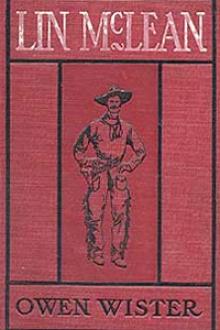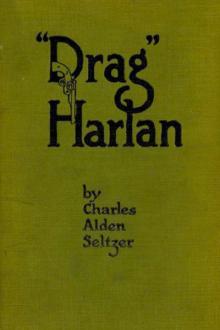The Jimmyjohn Boss, and Other Stories, Owen Wister [easy novels to read txt] 📗

- Author: Owen Wister
Book online «The Jimmyjohn Boss, and Other Stories, Owen Wister [easy novels to read txt] 📗». Author Owen Wister
“Another resemblance!” said the volatile and happy Gaston. “We both seem to have an eye for them. But, believe me, padre, I could never stay here planting olives. I should go back and see the original ones—and then I'd hasten up to Paris.” And, with a volume of Meyerbeer open in his hand, Gaston hummed: “'Robert, Robert, toi que j'aime.' Why, padre, I think that your library contains none of the masses and all of the operas in the world!”
“I will make you a little confession,” said Padre Ignazio, “and then you shall give me a little absolution.”
“With a penance,” said Gaston. “You must play over some of these things to me.”
“I suppose that I could not permit myself this indulgence,” began the padre, pointing to his operas; “and teach these to my choir, if the people had any worldly associations with the music. But I have reasoned that the music cannot do them harm—”
The ringing of a bell here interrupted him. “In fifteen minutes,” he said, “our poor meal will be ready for you.” The good padre was not quite sincere when he spoke of a poor meal. While getting the aguardiente for his guest he had given orders, and he knew how well such orders could be carried out. He lived alone, and generally supped simply enough, but not even the ample table at San Fernando could surpass his own on occasions. And this was for him an occasion indeed!
“Your half-breeds will think I am one of themselves,” said Gaston, showing his dusty clothes. “I am not fit to be seated with you.” He, too, was not more sincere than his host. In his pack, which an Indian had brought from his horse, he carried some garments of civilization. And presently, after fresh water and not a little painstaking with brush and scarf, there came back to the padre a young guest whose elegance and bearing and ease of the great world were to the exiled priest as sweet as was his traveled conversation.
They repaired to the hall and took their seats at the head of the long table. For the stately Spanish centuries of custom lived at Santa Ysabel del Mar, inviolate, feudal, remote.
They were the only persons of quality present; and between themselves and the gente de razon a space intervened. Behind the padre's chair stood an Indian to wait upon him, and another stood behind the chair of Gaston Villere. Each of these servants wore one single white garment, and offered the many dishes to the gente fina and refilled their glasses. At the lower end of the table a general attendant waited upon the mesclados—the half-breeds. There was meat with spices, and roasted quail, with various cakes and other preparations of grain; also the black fresh olives, and grapes, with several sorts of figs and plums, and preserved fruits, and white and red wine—the white fifty years old. Beneath the quiet shining of candles, fresh-cut flowers leaned from vessels of old Mexican and Spanish make.
There at one end of this feast sat the wild, pastoral, gaudy company, speaking little over their food; and there at the other the pale padre, questioning his visitor about Rachel. The mere name of a street would bring memories crowding to his lips; and when his guest would tell him of a new play, he was ready with old quotations from the same author. Alfred de Vigny they had, and Victor Hugo, whom the padre disliked. Long after the dulce, or sweet dish, when it was the custom for the vaqueros and the rest of the retainers to rise and leave the gente fina to themselves, the host sat on in the empty hall, fondly telling the guest of his bygone Paris, and fondly learning of the Paris that was to-day. And thus the two lingered, exchanging their fervors, while the candles waned, and the long-haired Indians stood silent behind the chairs.
“But we must go to my piano,” the host exclaimed. For at length they had come to a lusty difference of opinion. The padre, with ears critically deaf, and with smiling, unconvinced eyes, was shaking his head, while young Gaston sang “Trovatore” at him, and beat upon the table with a fork.
“Come and convert me, then,” said Padre Ignazio, and he led the way. “Donizetti I have always admitted. There, at least, is refinement. If the world has taken to this Verdi, with his street-band music—But there, now! Sit down and convert me. Only don't crush my poor little Erard with Verdi's hoofs. I brought it when I came. It is behind the times too. And, oh, my dear boy, our organ is still worse. So old, so old! To get a proper one I would sacrifice even this piano of mine in a moment—only the tinkling thing is not worth a sou to anybody except its master. But there! Are you quite comfortable?” And having seen to his guest's needs, and placed spirits and cigars and an ash-tray within his reach, the padre sat himself luxuriously in his chair to hear and expose the false doctrine of “Il Trovatore.”
By midnight all of the opera that Gaston could recall had been played and sung twice. The convert sat in his chair no longer, but stood singing by the piano. The potent swing and flow of tunes, the torrid, copious inspiration of the South, mastered him. “Verdi has grown,” he cried. “Verdi has become a giant.” And he swayed to the beat of the melodies, and waved an enthusiastic arm. He demanded every crumb. Why did not Gaston remember it all? But if the barkentine would arrive and bring the whole music, then they would have it right! And he made Gaston teach him what words he knew. “'Non ti scordar,”' he sang—“'non ti scordar di me.' That is genius. But one sees how the world; moves when one is out of it. 'A nostri monti ritorneremo'; home to our mountains. Ah, yes, there is genius again.” And the exile sighed and his spirit went to distant places, while Gaston continued brilliantly with the music of the final scene.
Then the host remembered his guest. “I am ashamed of my selfishness,” he said. “It is already to-morrow.”
“I have sat later in less good company,” answered the pleasant Gaston. “And I shall sleep all the sounder for making a convert.”
“You have dispensed roadside alms,” said the padre, smiling. “And that should win excellent dreams.”
Thus, with courtesies more elaborate than the world has time for at the present day, they bade each other good-night and parted, bearing their late candles along the quiet halls of the mission. To young Gaston in his bed easy sleep came without waiting, and no dreams at all. Outside his open window was the quiet, serene darkness, where the stars shone clear, and tranquil perfumes hung in the cloisters. And while the guest lay sleeping all night in unchanged position like a child, up and down between the oleanders went Padre Ignazio, walking until dawn.
Day showed the ocean's surface no longer glassy, but lying like a mirror breathed upon; and there between the short headlands came a sail, gray and plain against the flat water. The priest watched through his glasses, and saw the gradual sun grow strong upon the canvas of the barkentine. The message from his world was at hand, yet to-day he scarcely cared so much. Sitting in his garden yesterday he could never have imagined such a change. But his heart did not hail the barkentine as usual. Books, music, pale paper, and print—this was all that was coming to him, and some of its savor had gone; for the siren voice of life had been speaking with him face to face, and in his spirit, deep





Comments (0)